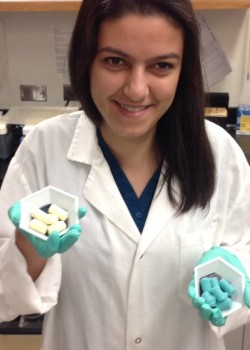
If you overeat, it might be a good idea to exercise
Biomedical investigators in the Faculty of Health Sciences, College of Medicine have published a study, which is the first to show environmental cues such as overeating and exercise target the level of a critical anti-obesity hormone, human growth hormone (GH), by affecting the 3D-structure of the chromosome in the region where the GH gene is found.
In their study, Hana Vakili, a Banting & Best Canadian Institutes of Health Research (CIHR) Doctoral Research Scientist, Yan Jin, Senior Research Associate and Peter Cattini, Professor and Head of Physiology & Pathophysiology, detected a change in the 3D-structure of the chromosome containing the GH gene in response to overeating and physical activity, and linked this to levels of GH production.
The findings, available today in the online Journal of Clinical Investigation, reveal these changes can occur very quickly and within days. Mice containing the human GH gene were placed on a three-day high-fat diet. During this time, the structure of the chromosome containing the GH gene changed resulting in a dramatic decrease in GH synthesis and secretion.
According to the CIHR funded study, prescribed physical activity can prevent this negative effect of overeating on chromosome structure, and limit the related reduction in GH production.
“Often we think of our genes as fixed things. We’re born with them, this is what our parents passed on to us and that’s the end of it but our findings show that this is not the end of the story,” says Cattini.
He notes this change in chromosomal structure will likely occur in anyone who overeats and doesn’t engage in any form of physical activity – regardless of being a healthy weight or overweight – however, obese individuals are at a greater risk.
“The extra negative is that as the individual becomes overweight, one of the natural things your body produces that might help you is actually being reduced even further… so it pushes you to become more overweight,” Cattini explains.
One method used to combat low GH levels found in obese individuals is the use of prescribed secretagogues (a substance that causes another substance to be secreted); the drug is used to trigger the pituitary gland to release more GH but this report presents new evidence explaining why these substances have had limited success in obese individuals.
“What we’ve found is that, probably, a major reason the drugs haven’t worked is there’s nothing there to be secreted,” says Cattini. “The obesity has not only blocked the release, it has actually blocked manufacture of GH by the pituitary.”
The outcomes of this research add to those in support of getting exercise, specifically the benefits of exercise if you are going to overeat, says Cattini.
For more information or to arrange interviews, contact Ilana Simon, Director of Communications & Marketing, College of Medicine, Faculty of Health Sciences, University of Manitoba, 204-789-3427, (cell) 204-295-6777 (ilana.simon@med.umanitoba.ca).







